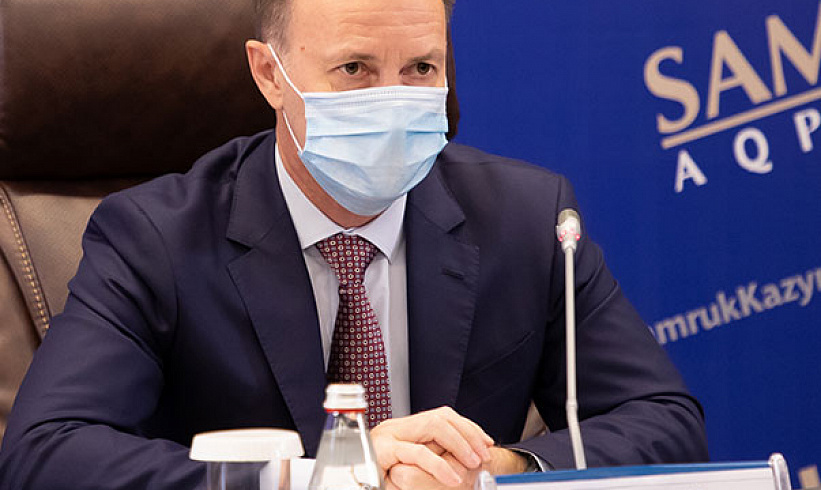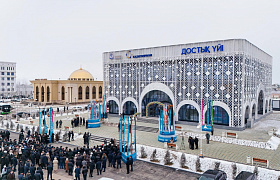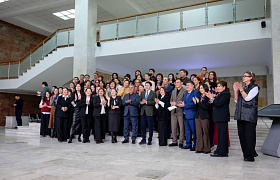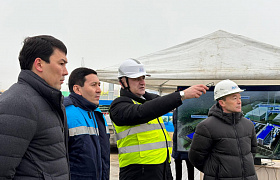"RISK MANAGEMENT OF THE SAMRUK-KAZYNA FUND TO SHOW ITS EFFICIENCY" - A. KRAVCHENKO

775
13 August 2020
The risk management of SWF Samruk-Kazyna JSC makes it possible to prepare in advance for the development of the situation in business and economy, to mitigate their consequences and to ensure the stability of the business. This was announced during an online briefing on the Samruk-Akparat information platform, Andrey Kravchenko, managing director for legal support and risks of the fund.
According to A. Kravchenko, currently 26 risks are in the focus of the Board of Directors and the Management Board of SWF Samruk-Kazyna JSC, 11 of which are given special attention. These include the risk of a continuation of the pandemic, commercial, social and market risks.
Andrei Kravchenko said that the conditions of quarantine directly and indirectly affect the business, but the companies of the fund group manage to go through this period without interruption. So, this year, the Fund will pay record dividends to the sole shareholder, the Government of the Republic of Kazakhstan, in the amount of KZT120 bln, which is 10 times more than in 2017. In addition, the Fund is actively providing assistance to the Ministry of Health and other departments in connection with the pandemic.
As a reminder, the net income of the SWF Samruk-Kazyna JSC group of companies at the end of the first half of 2020 amounted to about KZT212 bln, while the plan expected a loss of KZT150 bln. The consolidated net profit of the Samruk-Kazyna group of companies at the end of 2020 is expected to be KZT421 bln, which is 1.5 times more than the plan.
According to A. Kravchenko, the pandemic is the reason for the decrease in the volume of business of individual companies, in this regard, the business development plans have been revised towards cost optimization and more conservative forecasts.
“Even with this positive scenario, a number of risks remain significant for us, such as the price risk, the risk of a decrease in prices for goods and services, and primarily the price of oil. Its changes are themselves triggers for many other risks. Observers see that the dynamics of the oil price is now positive, but we do not remove this from the agenda due to the uncertainty of the epidemiological situation until the end of the year and such uncertainty in the global economy, ”said Andrey Kravchenko.
The list of risks continues to include a pandemic and oil price volatility, which seriously affects the exchange rate of the national currency. In this regard, among the critical risks there is a risk of changes in the exchange rate, which is typical for a number of companies, for example, JSC “NC“ KTZh”.
For example, KTZh carried out work to refinance foreign currency debt and reduce debt in hard currency by US217 mln through a ruble loan. In addition, Ekibastuz GRES 2 and Air Astana JSC transferred their debts in foreign currencies to tenge. The total amount of these changes for the two companies amounted to more than KZT120 bln. According to A. Kravchenko, these measures allow preventing losses due to exchange rate differences in billions of tenge.
Andriy Kravchenko also reported on the control of credit risks by analyzing the situation in the banking sector and individual banks that serve the group of companies.
Risks of asset seizure as a result of litigation abroad remained in the list of risks, however, already this month the Fund may mark a positive outcome for the Fund in the case of arresting a share of shares in Turkish “Shekerbank” in the amount of US38 mln. On June 5, 2020, these shares were removed from the arrest ... In addition, on August 6, 2020, the District Court for the Southern District of New York ruled in favor of the Fund in a dispute with a group of plaintiffs in which a US20 mln claim was unfounded.
Andrey Kravchenko stressed that the Fund has historically had a diversified portfolio of assets, which increases confidence in the stability of the business even in the most unfavorable crisis conditions. According to him, this allows maintaining intra-fund hedging of certain risks and business stability.
As an example of sustainability during a pandemic, he cited the activities of such companies as: Samruk-Energo JSC, which has a steady demand for electricity, Kazakhtelecom JSC - with an increase in demand for Internet access services and other online services, NK Kazatomprom - with a positive dynamics of growth in the price of uranium and, accordingly, the shares of the company itself.
During the briefing, A. Kravchenko said that apart from oil production, one of the most affected industries during the pandemic is passenger transportation, and the current year is the worst in the history of world aviation.
According to the International Air Transport Association (IATA), the demand for passenger air transportation for the first half of 2020 decreased by 58%, and the industry load factor decreased by 51% compared to 2019.
Nevertheless, as a result of the measures taken to strengthen liquidity and reduce credit risks, Air Astana JSC maintains jobs, stable liquidity and safety margin without any additional financial assistance from the state or the Fund.
In turn, Qazaq Air JSC continues to actively develop the interregional network of air routes and provide high-quality service to passengers, taking into account all safety requirements and anti-epidemiological measures.
The railway passenger transportation industry, using subsidies from the state and following the recommendations of the sanitary and epidemiological services, continues to serve passengers in a reduced version, but with the preservation of production personnel, and readiness to restore passenger traffic at the first relaxation of quarantine measures.
Рекомендуем

{{ $t('messages.news1') }}
The House of Friendship on behalf of the Samruk-Kazyna Group of Compan...

{{ $t('messages.news1') }}
During the visit to AlES JSC, the work of an AI project, an intelligen...

{{ $t('messages.news1') }}
Samruk-Kazyna Allocates KZT 994 Million to Renovate the Abilkhan Kaste...

{{ $t('messages.news1') }}
Nurlan Zhakupov, Chairman of the Management Board of Samruk-Kazyna, to...


